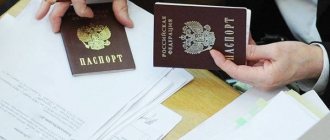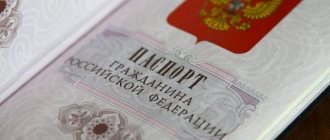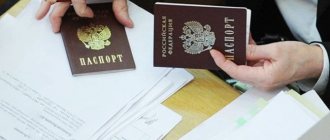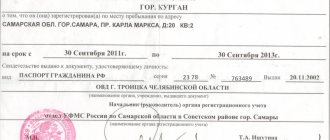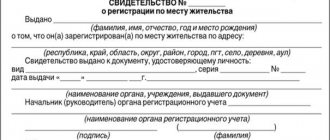A fine for expired registration is an administrative measure applied to citizens who have violated the requirements of the law regarding the registration of persons living in the territory of the Russian Federation, in accordance with which society and the state introduce registration at the place of residence and place of stay. Thus, a person who has an expired registration or does not have one is subject to administrative prosecution.
The concept of registration and punishment for its absence
Registration involves registering a citizen at the place of residence or stay. The concept of place of residence in this case means a residential premises in which a person permanently or temporarily resides. Accordingly, the first option is permanent registration, the second is temporary registration.
Sanctions for violating registration rules, as well as living without registration, are provided for in two articles of the Administrative Code. Article 19.15.1 applies to persons who do not have registration, article 19.15.2 - to citizens who have violated the registration rules. Moreover, in both cases, the same type of punishment is applied to the offender; only the amount of the fine imposed on the guilty person differs. In this case, much will depend on who and in what region the registration expired, how much time has passed and whether a fine was previously imposed.
How much do foreigners pay?
But what if a foreign citizen does not have registration? In this case, you will have to prove that the person was continuously in the country for 90 days. Punishment occurs only under such circumstances. What can you expect?
The penalty for lack of registration in this case will be similar. Either 2-3 thousand, or 3-5. It all depends on the situation and region of residence. A fairly common practice is the deportation of a person who has not registered within a certain time frame to his home country. This needs to be remembered. Therefore, foreigners, as well as “local” citizens, are advised to worry about having a residence permit.
No temporary registration
If a citizen enters the territory of the Russian Federation or temporarily arrives in another subject of the country, the period of his stay in the new territory cannot exceed ninety days. This means that before the expiration of a three-month period, a citizen has the right to stay at the place of residence without registration, however, after the period established by law, he is obliged to obtain a temporary registration.
Moreover, for foreigners, the period of stay on the territory of the Russian Federation without registration is much shorter than for citizens of the country. They must apply for registration no later than three days from the date of arrival.
Temporary registration involves registration not only in residential buildings, but also in other premises, for example, in sanatoriums, hotels, boarding houses, and government institutions. The management of some of them independently registers visiting citizens. However, if, after the expiration of the permitted period of stay, the fact of lack of registration is revealed, the citizen himself, as well as the person responsible for registering him, will be punished.
In this case, an expired temporary registration threatens to result in a fine:
- from 2000 to 3000 rubles - for the offender himself;
- from 2000 to 5000 - for tenants and owners who have not registered temporary residents;
- from 250,000 to 750,000 rubles - for legal entities.
At the same time, higher fines are applied to violators living in cities of federal significance than in other regions:
- from 3,000 to 5,000 rubles - for a citizen without registration;
- from 5,000 to 7,000 thousand rubles - for home owners;
- from 300,000 to 800,000 thousand rubles - for organizations.
It might be interesting
How to register at your place of residence correctly
For foreign citizens
In Russia there is a huge difference between foreigners and Russian citizens. Both with regard to staying without registration, and with regard to the liability that arises for failure to register. The first step is to figure out how long you can stay in the Russian Federation without additional paperwork and registration in principle.
First, it is worth considering the issue regarding foreigners. As practice shows, they are most often allowed to stay in Russia for 90 days without registering. Next you will have to register. Or wait for the traveler to receive a fine for lack of temporary registration.
If a person plans to work in Russia and came by invitation, then he will have to register with the migration authorities within a week. And during this time they ask you to register. Otherwise, certain problems will begin.
Thus, foreign citizens are usually allowed to stay in Russia for about 3 months without additional paperwork. By the end of this period you will have to register.
No permanent registration
Every citizen of the country living in a particular region, including newborn children, needs permanent registration. The concept of permanent registration in this case implies the residence of a person in the territory of one subject throughout his life. At the same time, a citizen can have both permanent and temporary registration within his region, for example, if he is registered from birth in the regional center, and performs work duties in another city in his region, and therefore most of the time he is forced to stay at the place of temporary stay.
The same cannot be said about moving. If a citizen moves for permanent residence to another place, registration at the new place of residence must be completed no later than seven days from the date of arrival. For newborn children, a thirty-day period is applied. Children under the age of fourteen, in accordance with legal requirements, are registered at the address of one of the parents (optional), regardless of the type of registration.
A fine for overdue registration of children is imposed on their legal representatives, that is, as a rule, on the child’s parents. The amount of the fine for the lack of permanent registration, including registration of a child, as well as in the case of lack of registration at the place of residence, is determined in accordance with the provisions of Article 19.15.1 of the Code of Administrative Offenses of the Russian Federation.
What amount of the fine will be imposed ultimately depends on the decision of the registration authority.
Where to apply for registration and where to pay the fine Today, citizens who need registration have several ways to apply for registration.
You can do this:
- Through the State Services portal (if you have a confirmed account) by submitting an electronic application;
- Through the department of the Multifunctional Center during a personal visit;
- By contacting the registration authority directly (local migration department of the Ministry of Internal Affairs);
- When you personally visit the passport office of the company servicing the residential building (MC or HOA).
The citizen himself decides which treatment option to choose, but the decision to prosecute for expired registration can only be made by an authorized body, that is, employees of the migration department. The same body decides how much the fine will be.
In accordance with administrative legislation, a resolution to bring the violator to justice is served personally, after which the citizen is given sixty days to pay the fine. If, after the period established by the administrative code, the migration department does not receive a notification of payment, there is a high probability that the citizen will be held administratively liable for failure to pay a fine within the period established by the Code (Part 1 of Article 20.25). In this case, the violator faces consequences including administrative arrest.
After imposing a punishment, a natural question arises: where to pay the fine for overdue registration? Since the authorized body does not have the right to accept cash from citizens, the fine can only be paid through a bank. At the same time, there are no restrictions regarding the choice of payment method, so you can deposit funds into the account of the Main Department of Migration Affairs of the Ministry of Internal Affairs:
- at a branch of a credit institution;
- online through the personal account of the user of banking services;
- through the bank terminal.
After making the payment, it is advisable to keep the receipt for payment of the fine. In practice, due to software failures, the fact of payment is not always visible, as a result of which the authorized body may request a payment document.
Can they be charged for expired registration in accordance with the Code of Administrative Offences?
The current legislation of the country does not directly provide for a penalty for missing the renewal of registration. However, expired registration is essentially its absence. For the lack of registration, the legislation of the Russian Federation provides for administrative liability under Art. 19.15.1, the sanctions of which contain the following types of penalties:
- If the offense was committed on the territory of St. Petersburg or Moscow, the offender will be punished with a fine, the amount of which is:
- From 3 to 5 thousand rubles. for citizens (individuals).
- From 5 to 7 thousand for persons acting as owners (tenants) of residential real estate, if they allowed such persons to live in the apartment (house).
- From 300 to 800 thousand rubles. for legal entities that are owners of premises, if they allowed the offense in question to be committed.
- If the offense was detected on the territory of other settlements located in the Russian Federation, then the amount of the fine will be as follows:
- From 2 to 3 thousand rubles. for citizens (individuals).
- From 2 to 5 thousand rubles for persons who are owners (tenants) of premises where citizens who do not have valid registration live.
- From 200 to 750 thousand rubles. for legal entities that allow citizens with missing registration to live in their premises.
For reference: this article itself provides for administrative liability for long-term residence in a specific housing without registration in it as a place of residence or place of stay. Specific periods allowing a person to stay in a residential or other premises without registration are established by current Russian legislation. In particular, Federal Law No. 109, which regulates the rules of migration registration of foreign citizens and stateless persons in the Russian Federation, and Law No. 5242-1, which allows Russians to move freely throughout the territory of the Russian Federation and choose their place of residence.
Read also: Is it worth moving to Krasnodar
Thus, not only the citizens themselves, but also the persons (both individuals and legal entities) who provided them with housing should monitor the relevance of registration.
If a relevant offense is detected, representatives of law enforcement agencies will review it, because It is they (Article 23.3 of the Administrative Code) who are entrusted with this function. Based on the results of the review, law enforcement officers issue a decision on prosecution.
If the deadline for renewal of registration was missed for valid reasons (for example, a long business trip, being treated in a medical institution, etc.), the person held accountable has the right to provide evidence confirming this fact - then punishment can be avoided – otherwise a fine will be imposed.
Before the resolution comes into force (10 days from the date of its delivery), a citizen acting as a person held accountable may try to cancel it by filing a complaint. In this case, the complaint can be sent to a higher authority or court.
The complaint must be made in writing. As a rule, the following information is entered into it:
- Name of the authorized body to which the appeal is made.
- Information about the person acting as the applicant (full name, residential address, contact phone number).
- Document's name.
- Description of the circumstances of bringing to responsibility.
- Indication of the reasons due to which the decision should be canceled.
- List of attached documentation.
- Complaint filing date and signature.
A completed complaint is usually submitted during a personal visit, but you can use other options - sending it by mail (by registered mail with notification and a list of attachments), or through a representative (an appropriate power of attorney will be required).
After receipt, the complaint is considered in the manner prescribed by law (in the presence or absence of the citizen), and then it is decided whether to cancel the decision or leave it unchanged. If the complaint is not satisfied, the decision will come into force and the person will have to pay a fine.
Is it possible to avoid responsibility?
If the fact of committing an administrative offense is obvious, it is unlikely that it will be possible to avoid punishment. However, any decision by an official may be appealed. The period for filing a complaint is ten days from the date of delivery of the decision, however, there is no particular point in filing a complaint if the citizen is held accountable within the framework of the law. For example, you should not file a complaint on the sole basis that the perpetrator did not know that every citizen of the country needs to register. Ignorance of the laws does not in any way diminish the guilt of the offender.
However, not for all categories of violators, expired registration is a death sentence. How to avoid a fine under current legislation? The answer to this question is contained in the note to Article 19.15.1, according to which you can avoid punishment for absence or untimely registration if the following circumstances exist:
- If a citizen is registered and temporarily resides in another city within one subject of the country.
- If a citizen lives without registration in a city of federal significance, but is registered in the same subject in which this city is located.
- If a citizen lives without registration in the same residential premises with his close relative, who is the owner or tenant of this premises. In this case, close relatives are considered to be the spouse, parents (including adopted ones), children (including adopted ones), grandchildren, grandparents.
In other cases, the lack of registration or untimely registration are gross violations of administrative legislation.
